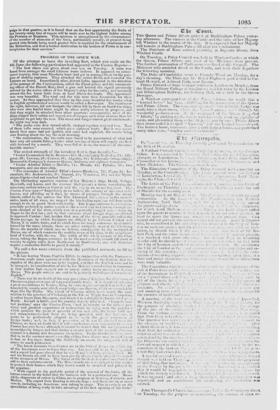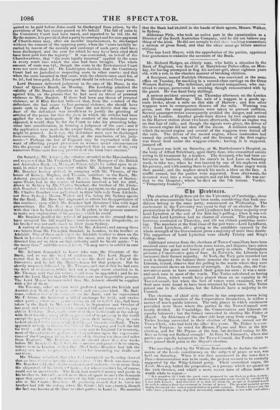; John Thorogood's Church-rate e .•
1m I ',.n.-is:ory t..'„ourt
I ou Tuesday, for the purpose of'tm
. . .
of: COSIS re-
quired to be paid before John could be discharged from prison, by the Provisions of the late statute passed on his behalf. The bill of costs in the Consistory Court had been taxed, and reported to be 16/. 13s.. ed. By the statute, it is provided, that a party in contempt and for non-payment of Church-rates may, after six months' imprisonment, he discharged without the consent of the opposing party, when the " costs lawfully in- curred by reason of the custody and contempt of such party shall have been discharged, and the sum for which he may have been cited shall have been paid into the registry." It was conteuded, on behalf of the Churchwardens, that " the costs legally incurred" applied to the costs in every court into which the case had been brought. The whole amount of costs was 911., though the costs in the Ecclesiastical Court were not more than 16/. Dr. Lushington decided, that the Consistory Court had no jurisdiction respecting costs in other courts ; and that when the costs incurred in that court, with the church-rates sued for, of 9s, 2d., had been paid, John Thorogood should be released from prison.
Lord Denman delivered judgment in the case of Mr. Dunn, in the Court of Queen's Bench, on Monday. His Lordship admitted the validity of Mr. Dunn's objection to the articles of the peace sworn against him, on the grouna that he had used no threat of personal violence to Miss Burdett. If there had been any threat of personal violence, or if Miss Burdett believed that, from the conduct of the defendant, she had cause to fear personal violence, she should have Made oath to that effect. The Court did not decide that the con- duct of the defendant was insufficient to justify the granting of articles of the peace, but that the Arm in which the articles had been applied for was inadequate. If the conduct of the defendant were repeated, it would then be for the Court to take his preceding beha- viour into consideration, in forming a judgment of the case ; and if the application were made in the proper form, the articles of the peace might be granted. As it was, the defendant must now be discharged from custody. His Lordship mided, at the conclusion of his judg- rnent—" Perhaps the law of England may be reproached with the want of affording proper protection to women under circumstances like the present ; and we may be surprised that in none of the very numerous Police-acts has any provision of the kind been enacted."



























 Previous page
Previous page